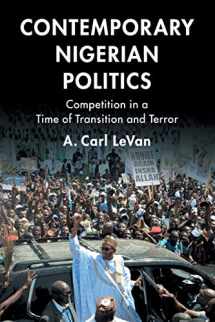
Contemporary Nigerian Politics: Competition in a Time of Transition and Terror
ISBN-13:
9781108459747
ISBN-10:
1108459749
Author:
A. Carl LeVan
Publication date:
2019
Publisher:
Cambridge University Press
Format:
Paperback
300 pages
Category:
International & World Politics
,
Politics & Government
FREE US shipping
Book details
ISBN-13:
9781108459747
ISBN-10:
1108459749
Author:
A. Carl LeVan
Publication date:
2019
Publisher:
Cambridge University Press
Format:
Paperback
300 pages
Category:
International & World Politics
,
Politics & Government
Summary
Contemporary Nigerian Politics: Competition in a Time of Transition and Terror (ISBN-13: 9781108459747 and ISBN-10: 1108459749), written by authors
A. Carl LeVan, was published by Cambridge University Press in 2019.
With an overall rating of 4.4 stars, it's a notable title among other
International & World Politics
(Politics & Government) books. You can easily purchase or rent Contemporary Nigerian Politics: Competition in a Time of Transition and Terror (Paperback) from BooksRun,
along with many other new and used
International & World Politics
books
and textbooks.
And, if you're looking to sell your copy, our current buyback offer is $1.01.
Description
In 2015, Nigeria's voters cast out the ruling People's Democratic Party (PDP). Here, A. Carl LeVan traces the political vulnerability of Africa's largest party in the face of elite bargains that facilitated a democratic transition in 1999. These 'pacts' enabled electoral competition but ultimately undermined the party's coherence. LeVan also crucially examines the four critical barriers to Nigeria's democratic consolidation: the terrorism of Boko Haram in the northeast, threats of Igbo secession in the southeast, lingering ethnic resentments and rebellions in the Niger Delta, and farmer-pastoralist conflicts. While the PDP unsuccessfully stoked fears about the opposition's ability to stop Boko Haram's terrorism, the opposition built a winning electoral coalition on economic growth, anti-corruption, and electoral integrity. Drawing on extensive interviews with a number of politicians and generals and civilians and voters, he argues that electoral accountability is essential but insufficient for resolving the representational, distributional, and cultural components of these challenges.


We would LOVE it if you could help us and other readers by reviewing the book
Book review

Congratulations! We have received your book review.
{user}
{createdAt}
by {truncated_author}


